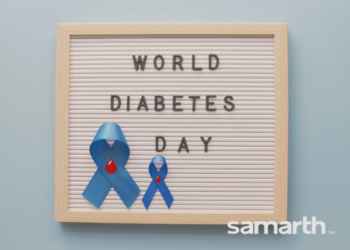Gone are the days when people used to be anxious about being diabetic. These days, diabetes is a lifestyle disease, and almost every third or fourth person you talk to in the senior age group will be affected by it directly or indirectly. India has the second-highest number of diabetes-afflicted people, with over 74 million adults. The worry is that over half of these are yet undiagnosed! This number is expected to go over 124 million by 2045. What is more worrying is that another 40 million Indian adults are at high risk of developing Type 2 diabetes.
Let’s take the Samarth family as a sample. A whopping 87.8% of seniors who took our Diabetes survey confirmed they have diabetes and are under treatment. It’s not surprising that 63.9% of these have been living with diabetes for more than ten years. Expectedly 77.8% of these are Type 2 diabetics. We can look at this statistic positively to show that diabetes does not necessarily affect a person’s longevity, provided they take the necessary care.
Diabetes is a highly prevalent health issue in India that needs attention. A healthy lifestyle can go a long way in preventing or controlling it so people can live normally. 55.3% of seniors are moderately aware and 15.8% are very knowledgeable, about diabetes management as confirmed through our survey. It is a key focus health area for most Physicians in India, as most of their senior patients will be diabetics. With the rise of digitisation and accessibility to information and healthcare has also improved. So, what are the four main areas to manage diabetes?

Join Now >
- Monitor glucose levels
Diabetes is a condition where the blood glucose level, rises above the accepted level. This condition happens when the pancreas is not producing enough insulin or if the body is not responding to the insulin as expected. Diabetes is a chronic condition that needs lifelong management. Therefore, once a person is confirmed to have diabetes, monitoring the blood glucose levels is essential. These days, you have glucometers that can help you track your blood glucose levels at home. However, these are random checks to monitor the pattern. Most physicians advise a proper blood test at least once in six months to monitor diabetes. 36.8% of seniors who took our survey have confirmed they adhere to this periodicity.
- Diet management
Since blood glucose levels depend on what we eat, diet management is essential for diabetes management. Since insulin and carbohydrates are linked, people with diabetes should watch the amount of carbs in their diet. People with diabetes should follow a healthy and balanced diet that provides the required nutrients without spiking their blood sugar levels. Consuming foods with a low glycaemic index is a good practice, so they get digested slowly and won’t add to the blood sugar levels immediately after eating.
To include: Whole grains, fresh fruits and vegetables, lean proteins, low-fat dairy, and healthy fats (nuts and seeds).
To avoid: High-sugar foods without any nutritional benefits, such as sweetened aerated drinks, fried foods, and sugary desserts. Minimise or avoid alcohol consumption. Interestingly, % of seniors said they consume sugary drinks only rarely. So, we have a great set of seniors who know the dos and don’ts.
72.2% of seniors who took our survey have indicated that they follow a special diet plan to keep their diabetes under control.
- Remain active
Regular exercise is an essential part of diabetes management. Diabetics must engage in 30 minutes of mild exercise at least five days a week. Walking, aerobics, swimming, or even cycling are good options. However, they should watch for signs of low blood sugar during exercise, such as dizziness, sweating, or weakness. Sometimes, people also feel confused. They should immediately stop the exercise and take precautions to recuperate. Ideally, the physician can suggest the amount of exercise needed. What is heartening is that 86.8% of seniors voted for this option as the ideal to stay healthy.
- Follow prescribed medication
Depending on the type and severity of diabetes, doctors prescribe medications. While some may have to take insulin injections, most others can manage diabetes through oral pills. 100% of seniors who responded to our survey say they are on medication pills. The medications, the dosage, etc., vary depending on many factors. Hence, one should not take another’s medicine or change the dosage without consulting the doctor. Strictly follow the dosage prescribed by the doctor. If there are any issues or side effects noticed, discuss with the doctor to take remedial actions.
It is evident from our survey that most seniors are aware of most aspects of diabetes management. However, we hope that this article can help them understand some nuances better to finetune their diabetes management strategies to live a normal and healthy life.









